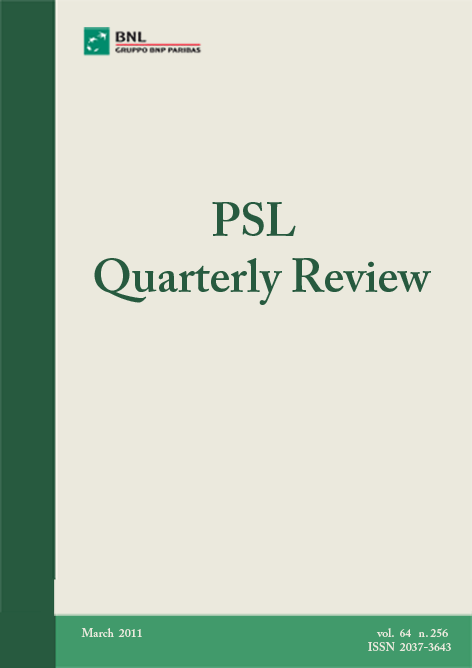Resolving the US financial crisis: politics dominates economics in the New Political Economy
DOI:
https://doi.org/10.13133/2037-3643/9420Keywords:
political economy, financial crisis, Keynesian policies, USAAbstract
Most economists expected that the “Great Recession” produced by the financial meltdown of 2008 would usher in a resurgence of traditional Keynesian economics and a decline of what has come to be called “market fundamentalism”. By contrast, also due to the inadequate size of the 2009 stimulus package, the resurgence of support for Keynesian expenditure policies has been extremely short lived. However, the negative popular and political reaction should not have come as a surprise, at least for three reasons: the design of the Obama stimulus plan and its difference from the expenditure policies of the Roosevelt Administration; the political environment that has eviscerated fiscal policy and placed monetary policy at the centre of economic policy and produced “debt driven” growth; the difference between policies appropriate to treating an income deflation and a debt deflation.
JEL Codes: G01, B50, N12, H12
References
BARBER W. (1996), Designs Within Disorder: Franklin D. Roosevelt, the Economists, and the Shaping of American Economic Policy, 1933-1945, Cambridge: Cambridge University Press.
BERNANKE B.S. (2004), “The Great Moderation”, remarks by Governor Ben S. Bernanke at the meetings of the Eastern Economic Association, Washington (DC), February 20, 2004.
BOSKIN M.J. (2009), “Obama’s economic Fish Stories”, The Wall Street Journal, July 21, 2010.
COHEN A. (2009), Nothing to Fear: FDR’s Inner Circle and the Hundred Days that Created Modern America, London: Penguin.
FISHER I. (1906), Capital and Income, Basingstoke: Palgrave Macmillan.
KEYNES J.M. (1930), A Treatise on Money, Basingstoke: Palgrave Macmillan.
KEYNES J.M. (1937), “How to Avoid the Slump”, The Times, January 12-14.
KOO R.C. (2008), Balance Street Recession: Japan’s Struggle with Uncharted Economics and its Global Implications, Hoboken (NJ): John Wiley.
KREGEL J.A.(2008), “The Continuing Policy Relevance of Keynes’s General Theory”, in
FORSTATER M. and WRAY, LR. (eds), Keynes for the Twenty-First Century, Basingstoke: Palgrave Macmillan.
LAMBRO D. (2009), “Stimulus impact disputed”, The Washington Times, October 6, 2009.
LEON P. (1967), Structural Change and Growth in Capitalism, Baltomire: Johns Hopkins University Press.
LIZZA R. (2009), “Larry Summers and the White House economic team”, The New Yorker, October 12, 2009.
MINSKY H.P. (1986), Stabilising and Unstable Economy, New Haven (CU): Yale University Press.
PASINETTI L.L. (1993), Structural Economic Dynamics. A Theory of the Economic Consequences of Human Learning, Cambridge: Cambridge University Press.
SHENG A. (2009), From Asian to global financial crisis an Asian regulator’s view of unfettered finance in the 1990s and 2000s, Cambridge: Cambridge University Press.
Downloads
Published
How to Cite
Issue
Section
License



